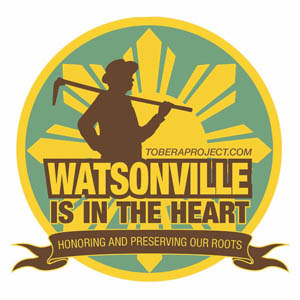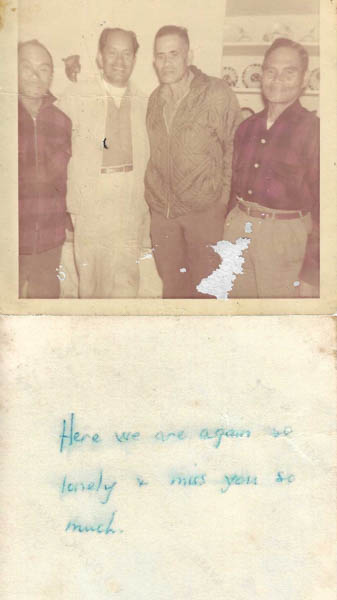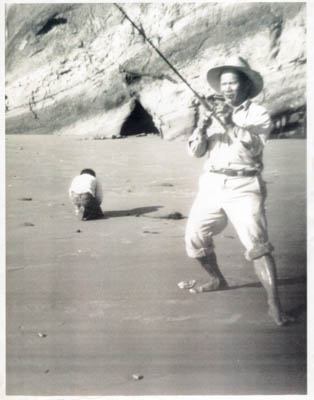Watsonville Filipino History Archive Set To Launch At April 9th Public Event

UC Santa Cruz faculty and students have been collaborating with leaders of Watsonville’s Filipino community for the past year to build a new community archive that will be publicly unveiled during a launch event on Saturday, April 9th.
Members of the community can register to attend the free event, from 7-9 p.m. at the Santa Cruz Museum of Art & History, to celebrate the launch of the Watsonville is in the Heart Digital Archive. The archive features oral history recordings, original documents, photos, and family artifacts highlighting Filipino history in the Pajaro Valley, starting with the “Manong generation,” the first wave of Filipino immigrants who arrived in the 1920s and 1930s.
The project was initiated by community leader Dioscoro “Roy” Recio, Jr., whose parents were descendants of local Manong. Recio noticed a conspicuous lack of inclusion of Filipino narratives in local historical accounts, and he wanted to ensure that the stories of early immigrants weren’t lost to time. So he started organizing community members to share stories and showcase family heirlooms reflecting Filipino heritage.
Those efforts grew into a partnership with UC Santa Cruz, and faculty and student researchers from the Humanities, Social Sciences, and Arts Divisions have since been helping to develop an oral history archive and digital exhibition that will be publicly accessible as part of the McHenry Library’s special collections. The archive is still in its early stages of development, but the launch event will share how to view it online. There will also be pop-up exhibits and interactive kiosks to help guests explore the archive’s current content.

“I think people are going to be totally blown away and impressed by the work that will be displayed on April 9th,” Recio said. “The UCSC team has done a wonderful job. They’ve been very diligent, very professional, and very true to the mission and vision of the project, and they’ve been working hard to make the archive lively, enchanting, and engaging. We’re making excellent progress.”
The launch event will also feature a panel discussion with three community members—Juanita Sulay Wilson, Eva Alminiana Monroe, and Antoinette DeOcampo Lechtenberg—who are key contributors to the oral history project. The discussion will highlight the role that women have played as cultural carriers in the local Filipino community, as they passed down language, customs, and more to their children across generations.
In fact, family is a unifying theme throughout the archive materials, which speaks to the strength and resilience of the community. Most members of the Manong generation left the Philippines as single men and were recruited into agricultural work in the Pajaro Valley. Women and children in the Philippines were often legally barred from joining them, and racist laws in California also made it largely illegal for the Manong to marry women they met after arriving in the state. But there are many stories of how love overcame those barriers.
The archive contains several marriage certificates from neighboring states, like Washington and Arizona, that show how some interracial couples built families. Manong also maintained close ties with family in the Philippines, sending photos and heartfelt correspondence back and forth. In some cases, family members from the Philippines were ultimately able to reunite with loved ones in the Pajaro Valley as immigration policies changed. But for the majority of Manong, who never had children of their own, the tight-knit local Filipino community became their family.
These are the types of stories that the digital archive will share. Steve McKay, an associate professor of sociology and one of the faculty leaders of the project, said it has been a moving experience for UCSC researchers to work alongside community members on these efforts.
“We are so honored to be able to share such intimate stories that people tell us about their families and that they trust us with that,” he said. “The families I’ve talked to have been thankful that there’s going to be an archive so that their family stories aren’t lost. That’s really important, and we feel a lot of responsibility around that. It’s something that we can give back to them.”

Through sharing perspectives from the community, the archive documents Filipino life in the Pajaro Valley with a depth and richness that’s currently missing from historical accounts. Most records of early Filipino immigrants in the area focus only on their exploitation as low-wage farm laborers, or on the violence they endured, like the 1930 Anti-Filipino Watsonville Race Riots.
But the new archive’s first digital exhibit, titled “More Than Their Labor,” takes a very different approach by broadening the frame beyond those traumas to show Manong and their families in happy moments of leisure. Christina Ayson Plank, a doctoral candidate in UCSC’s History of Art & Visual Culture Department, led development of the exhibit.
“I wanted this exhibit to showcase how the Manongs were more than their laboring bodies, and you can actually see from the archives how they moved around when they were just having fun and hanging out, and that shows how they made friends and created community,” she said. “This is part of how they were building a home in Watsonville.”
As the archive continues to grow, a K-12 ethnic studies curriculum will also be developed around the archive materials, and the archive collection efforts will culminate in a 2024 exhibit at the Santa Cruz Museum of Art & History. In the meantime, Kathleen Gutierrez, an assistant professor of history and faculty leader on the archive, said that UCSC members of the project team are looking forward to hearing many more stories from the community and are grateful to Recio for the opportunity to be involved.
“Roy’s energy for this initiative is endless, and I’m often struck by his commitment,” Gutierrez said. “He drives this work and reminds me of the power of community-engaged projects. It’s wonderful to see his vision—and that of other Pajaro Valley community members—materialize.”
Original link: https://news.ucsc.edu/2022/04/filipino-history-archive-launch.html
